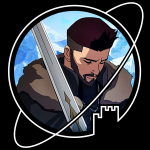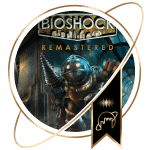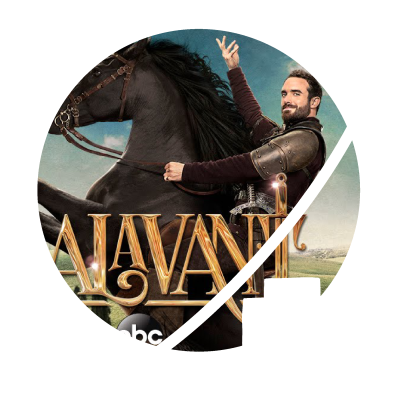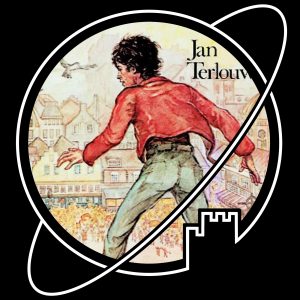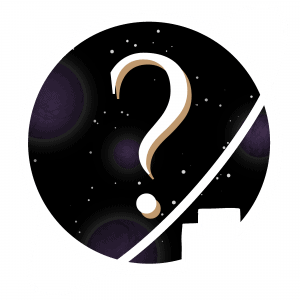Welcome to the Escape Velocity Collection!
We are an opinionated group of friends reviewing all sorts of fantasy and science fiction media. Don’t forget to get to know the curators and visit our curated Collection, where we discuss the stories that never cease to transport us to another world.
Will you escape with us?
LATEST POSTS:
December 26, 2021

Collected on: December 26, 2021
- Video Game developed by Bioware
- Released in 2009
- Platforms: Microsoft Windows Xbox 360 PlayStation 3 Mac OS X
- Part one in the Dragon Age series
Forced by circumstances to leave your old life behind, you join the ranks of the Grey Wardens, an ancient order sworn to protect the world against the murderous Darkspawn. Though the fate of the whole continent lies in the balance, you’re the people’s only hope to stop their imminent advance. However, you’ll have to navigate the politics of several factions and explore dangerous locations to stand a chance. Shall you succeed?
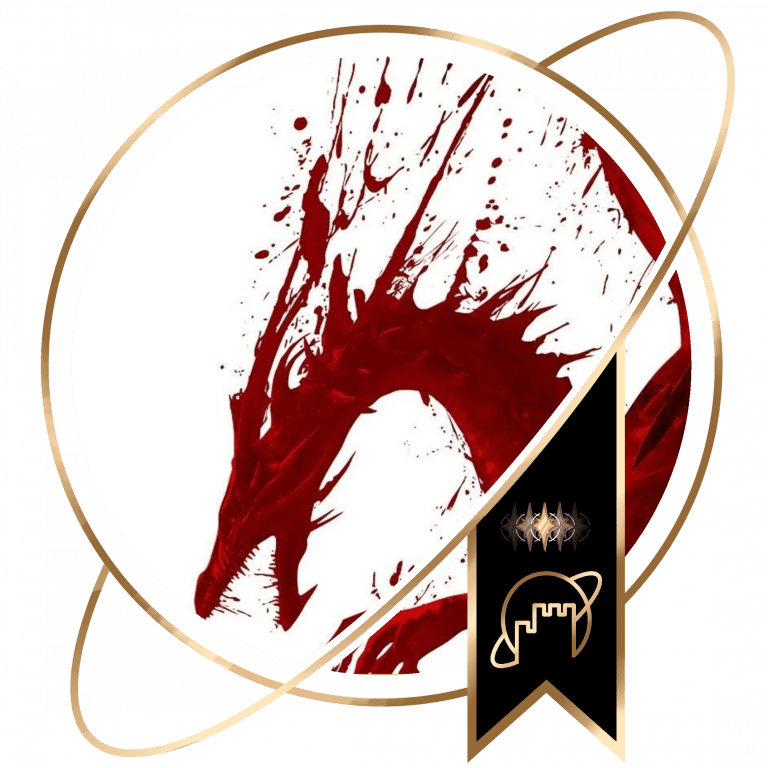
Jop: Welcome to this in-depth, spoiler-free discussion of the video game Dragon Age: Origins (yes, the first one), which our curator Jop has added to the Escape Velocity Collection, a series of items that we believe represent the absolute peak of what the speculative genre has to offer.
I challenged Jop to defend this addition to the Collection – why should everyone start their Dragon Age journey at the first installment?
Defended By

JOP
Versus

PETER
As usual, I would like to start the conversation by asking when you first played Dragon Age: Origins, and what makes you remember it so fondly more than ten years after its release?


I was under 16 years old when a friend first showed me bits and pieces of Dragon Age: Origins. I played through some levels without any knowledge of the overarching plot and the specifics of the world. However, I remember I was deeply impressed by the extensive lore and the elements of choice. This was my first experience with roleplaying that offered me choices that the world actually reacted to, and I thought it magical! Here there was this gigantic, mystical fantasy world with its own detailed history, and I could impact how the future would look like? Not only that, I was able to travel with companions that really were well-rounded characters that had their own opinions on things? It evoked a weird mixture of wonder, adventure and godlike hubris in me, that I haven’t often felt since those early days of playing.
Even nowadays, the scope of the worldbuilding is something that gets to me. However, I think it is the unique way in which Bioware handles companions that I’m still deeply in love with. It’s not something I see well executed often.
Worldbuilding
You just said that the worldbuilding was one of your favourite elements of Dragon Age. Dragon Age is set in a relatively generic medieval European fantasy setting – we have men, elves, dwarves, not-orcs called darkspawn, and, unsurprisingly, dragons; A kingdom with politicking barons, rivalry between mages and the church. At first glance, nothing new under the sun. If we dig a little deeper, what are the elements of worldbuilding that really drew you in?


Though you paint a fairly correct picture of what Thedas (the Dragon Age setting) looks like, Dragon Age actually manages to subvert many of the archetypes and tropes you would expect. Elves are not the superior species, the fair folk, but rather the outcasts of society and constant victims of discrimination. The dwarves are not a traditionally loyal and proud warrior culture, but instead a society of mostly merciless and backstabbing brutes. BioWare lures you with a false sense of familiarity with their tropes, but then surprises you with their execution.
Aditionally, what really stands out to me in Dragon Age’s worldbuilding, are the many secrets it harbors. Way too often in speculative fiction, you get told how a world works, and than that’s it. No twists and turns, just a clear and static world. But not so in Thedas. Sure, you’ll get tonnes of information and worldbuilding tidbits thrown at you, by both characters and in-world codexes. However, just like in the real world, it seems the truth of these sources is often very subjective. Things are not what they at first appear, and even things that seem clear-cut might suddenly be highlighted from a completely different perspective. To discover the ultimate truth, you’ll always have to delve a whole lot deeper.
Characters
I know you love character driven stories, and, as you said, that too was one of the aspects that drew you into Dragon Age. Could you elaborate on how the characters in Dragon Age are different from the stereotypes that we often see in video game writing?


The funny thing with many of Origins’ characters is that they very much seem like stereotypes, but they always come with a significant twist. Take the nobleman’s bastard, trained as a templar, for example. He’ll probably be a natural born leader, right? Well, not in Dragon Age. Your “mentor characters” are callous or short-sighted, while the characters that appear ruthless can suddenly harbor a misleadingly soft-hearted side. No one is predictable.
Furthermore, something that really stands out te me is how the characters develop as the story moves on, partially depending on your choices. Especially in the case of the companions. At the end of the road, it is as much their story as it is your character’s. I really love that.
You mention character development, which is a trait we associate with literature (or perhaps film) more often than with video games – could you perhaps elaborate on how the characters develop, how you experienced it and how that is different in a game compared to a book?


Certainly. Origins comes with the so-called approval system for your companions, in which the game tracks to what extent your companions like (or dislike) you. Dependent on their relationship with you, your companions open up about their (tragic) backstories and you get the opportunity to discuss your opinions. In addition, when a character likes you, they are more likely to give you the benefit of the doubt when you perform a deed they find questionable. This allows you to somewhat shape your companion’s views. Especially Alistair and Leliana can undergo some significant character development in this way.
I really liked how my character wasn’t the only one with opinions and goals. It feels less like you’re playing a video game on your own. I also think this is where it really differs from character development in books. When you’ve personally travelled with someone for hours, chatting with them when you feel like it (or even romanced them), their eventual character development hits closer to home. It feels like you were part of that development. It’s less static than how its done in books.
Choices
You mentioned the choices as a key part of your enjoyment of the game, so let’s take some space to discuss those. Right when you load into a new game, before the rest of character creation, you are presented with an option for an origin, giving the game its name. The origins range from wood elf to dwarven slum dweller, and each of them comes with a unique, role-play heavy origin story that acts as a sort of prologue to the main game. In the main game as well, you are presented with a fork in the road from time to time.
Could you tell us about some of your favourite choices, without spoiling too much?


Oof, without spoilers, huh? Well, one of my favourite choices might actually be the option to choose your origin at the beginning of the game. Like you said, these are some wildly different beginnings to the game, and they all really impact how you play your character through the rest of the story. You choose to be an city elf or an mage? Prepare to be distrusted by almost everyone you meet. Alternatively, if you begin as a human noble, you’ll find that some of your privileges actually carry over till later in the game.
Some other choices I liked were the ones concerning your companions and the gathering of allies. These are often quite difficult and both choices tend to be morally ‘grey’. At times the stakes of these choices are also very personal, so deciding on a way forwards can be a delightful conundrum.
On a critical note, it sometimes felt to me like the choices you are presented with create a rather superficial divergence of paths – as an obvious example, each of the origin stories eventually leads to the start of the main game, which is a relatively fixed point. You’ll run into similar fixed points or outcomes as you play further. Do you feel the choices in Dragon Age: Origins have a meaningful impact on the player experience?


I certainly think the impact is meaningful, though it depends on what you’re looking for as a player. Your choices shape the future of the world and are reflected in the lore. Characters will respond to your actions and remark on them. Furthermore, when you play the later installments in the series, you are occasionally reminded of the choices your previous characters made. This is something I truly enjoy.
However, when you look at the impact your choices have on a gameplay level, its scope is much smaller. Though you have a lot of freedom to choose which paths you take in which order, there are certain fixed checkpoints you’ll always have to pass.
One gameplay element many people might be curious about is whether you feel the choices create replayability. A (perhaps unfair) example is the second installment in the Witcher-series of video games, in which a couple of choices at the start of the game can mean playing through a completely different storyline. To what extent do you feel Dragon Age lets you play a different story if you make different choices?


The Witcher 2 example is quite tricky, because that’s a kind of mechanic I’ve seldom encountered in any other games. Though it’s very cool, it is not easy to match. Like I admitted, Dragon Age’s story has some fixed points that will be the same for every playthrough, both in the terms of gameplay and lore. Yet, out of all the Dragon Age games, I’ve replayed Origins the most times with very different characters and choices. And still I have yet to see everything this wonderful game has to offer. If that isn’t a testament to its repayability, I don’t know what is.
Gameplay
Speaking of gameplay, I notice that it was one of the points you did not mention at the start of this discussion when I asked you what made you love Dragon Age. Is the gameplay a secondary consideration for you? Playing the game, you’ll likely encounter a whole lot of it…


There’s gameplay in games?
All joking aside, yeah, gameplay is indeed only a secondary consideration for me. I’ll be one of the first to say that Origins mechanics are quite clunky. If you want it to be, the combat can be pleasantly tactical and challenging. However, I’m more the kind of player that will set a casual difficulty when playing games that are driven by story or characters. I know there are people who absolutely adore Origins gameplay, as well as people who thoroughly despise it. I can only say I didn’t mind it either way.
Age
I know Dragon Age has often been called a spiritual successor to Baldur’s Gate, another RPG by BioWare that I love a lot. Looking from a distance, the games might not look alike at all, but upon closer inspection, there are many similarities: both role-playing games where you gather a party of companions and embark on a quest to save the nation; in both of the games, a lot of the roleplay takes place via text-based conversation menus; both games allow for detailed customisation in character progression; both games allow you to pause the game mid-fight, take control of you companions, and order them to take specific actions.
Really, if you think about it, the only real difference is the game’s presentation of the world: where Dragon Age takes more of a fully rendered approach similar to many third-person action-RPGs (which, really, it isn’t), Baldur’s Gate has classic top-down isometric graphics. Perhaps surprisingly, it feels to me as if Baldur’s Gate has aged a lot better, despite being simpler and older.
The question that all this leads into is: would you still recommend Dragon Age: Origins to people in 2021 (or by now I shoudl be saying: 2022)? Do you feel like its presentation and age hold it back?


Am I not right now discussing how Dragon Age: Origins should be added to our Collection? Age doesn’t matter when a story is unique and well-executed. I know you believe this is true for books, and I state it’s also true for video games.
Yes, the graphics will no longer impress anyone (though it seems there are some magnificent fan-made mods out there that solve this somewhat), but why judge a book by its cover? The ‘soul’ of the game is timeless, how it tells its story and provides the gamer with heartfelt choices and characters. Frankly, I wish there were hundreds of similar games I could recommend in Dragon Age’s place, but this isn’t the case. In all these years, there are only a few who managed to match its strong points. In my opinion, Origins was somewhat of a trailblazer and – though it’s far from perfect- I think everyone wit a love for fantasy, roleplaying and the ‘choice matters’-format should still give this game a go.
I might touch upon one other point where the game shows its age. When I sat down with my girlfriend to start a new game of Dragon Age: Origins for this review, she chose to play a female wood elf. The first thing that appeard on the screen was.. an elf girl in bikini armour. Some of the outfits of important female NPCs are little better. That’s jarring in this day and age, and a serious strike against the game for me. Would you agree?


I agree that’s quite jarring. Though Origins was quite progressive for its time when it came to societal values, the game does not meet today’s standards on multiple accounts. For me, it doesn’t take away from its charm, but it is a fair disclaimer to share. Later Dragon Age games score a lot better in this regard.
Conclusion
And I have a feeling we might see some of those other Dragon Age–titles in this space at some point as well! With that said, I think we can conclude that if you are interested in a choice-based, character driven video game experience and aren’t too bothered by gameplay or graphics, Dragon Age: Origins is as good as they come even after a dozen years. Is there anything you would like to add to that conclusion?


Yes, swooping is bad…
That’s been us for now folks, and the message is simple – if you have time to kill this holiday season, why not give Dragon Age: Origins a spin?

- Adventure, Atmospheric, Character-Driven, Discrimination, Dragons, Exceptional Worldbuilding, Exploration, Fantasy, Fellowship, High Fantasy, Journey, Last Stand, LGBTQ+, MacOS, Microsoft Windows, Nobledark, Original Setting, Playstation 3, Politics, Quest, Religious Themes, Revolution, Role Playing Game, Series, Single-player, Story-Driven, Violence & Gore, War, Xbox 360
Check out our reviews of some of the media recommended in this post:
The new year is almost here! I happen to be the kind of person who loves setting goals, so I’ve compiled a little list of resolutions you can make for the new year, specifically tailored to consuming Fantasy and Science Fiction media! Let’s dive in, shall we?
1. Try the genre you usually don’t go for
I know I’m not alone in saying that while I love both Fantasy and Sci-Fi, if given the choice I will usually go for Fantasy. This upcoming year, why not make a resolution to focus a little more on the side of the genre you usually ignore?
For Fantasy Lovers, I would recommend starting out with the movie Dune, which reminded me a lot of the vibe of the Lord of the Rings.
For Sci-Fi Lovers, why not try something like American Gods? I like to see Urban Fantasy as a bridge between Classic Medieval Fantasy and something like a Space Opera.
2. Read/Watch/Play the Classics
Some of us love reading the classics. Others haven’t read Dune yet even though they were technically in a book club which chose to read Dune, but quite frankly they were living in another country at the time, and though Covid meant the book club kept getting put off, they never really got around to it. It definitely wasn’t their fault though. Pretty universal experience, right? Right?
Anyway. Maybe commit to exploring some of the classics next year.
3. Try the thing you’ve been scared to commit to
I used to watch Critical Role religiously, and would often hear people say that they do want to watch it, but they’re intimidated by the amount of time that goes into watching a D&D stream. I totally get that.
I think it’s important to recognise that if you spend time on something that you enjoy, that time was still valuable and isn’t “wasted” if you don’t finish the thing. I haven’t finished campaign 2 of Critical Role, but I really enjoyed the, ahem, rather large chunk of time that I did spend watching it. Life isn’t about crossing things off of your “to watch/play/read” list – it’s about doing things that you enjoy until you no longer enjoy them.
4. Finish something you’ve been avoiding finishing
Who doesn’t have books they’ve been meaning to finish? Video games they started but then neglected in favour of games we’ve already played countless times but can’t seem to stop replaying? Or TV shows that keep coming out with new seasons that end up getting added to Netflix in one go when you’ve kind of lost momentum and moved on to something else?
This coming year, perhaps you could to try finishing some of these. I, personally, intend to finish The Witcher 3 and Bioshock 2.
5. Make something you’ve been meaning to make for a while
I know a lot of us Fantasy and Sci-Fi lovers have our own projects we’re working on. Here at Escape Velocity, we’re all pretty creatively inclined. This means we know exactly what it’s like to have a bunch of projects that you’ve been meaning to work on but putting them off because you feel like you don’t have the time or skill to pull them off.
This next year, why not try your hand at some of the projects you’ve been putting off?
That’s all I’ve got for you, folks! I hope this gave you some inspiration for you own resolutions, and if you have Sci-Fi/Fantasy related resolutions that I haven’t mentioned in this list, we’d love to hear about them on our Social Media!
Reviewed by:
- Video game developed by Wormwood Studios
- Directed by Mark Yohalem
- Published by Wadjet Eye Games
- Released 25 May 2021
- Point-and-click adventure
- Platforms: Microsoft Windows, Linux, MacOS
- Playing time: 6-8 hours
In this point-and-click video game by Wormwood Studios, the developers behind the brilliant Primordia, you’ll find yourself trapped on a floating festival ground in a madness-inducing cycle of death, desperation and poor jokes, chasing a golden-haired woman through a creepy world of croaking ravens and hollow laughter, running away from a dark thing that lashes out and kills you without the least provocation. Can you keep your wits together long enough to find out what is going on, and who you are?
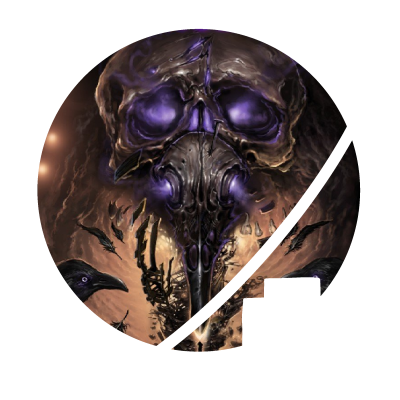

Strangeland by Wormwood Studios, the developers of the brilliant Primordia, is in the unenviable position of succeeding one of my favourite video game experiences ever. I’m going to admit right of the gate that it didn’t quite live up to that expectation; but then, Primordia was exceptional and I am not sure if any game could have.
Having said that, Strangeland is a great point-and-click adventure, that, like Primordia, has a very distinctive art style and soundscape that make for a very atmospheric experience. Where Primordia went with a post-apocalyptic wasteland, Stangeland goes for an occult horror vibe of bodiless fortune-tellers and eyeless scribes, talking ravens and people in straightjackets. I understand that the creepy carnival-style horror is not for everyone, but for some reason I love that trope. Especially when mixed with various references to Poe and Norse mythology (and probably all kinds of things that I missed), it made me feel right at home.
The gameplay is what you’d expect from a point-and-click adventure, with an avatar moving through several screens looking for objects to solve logical (and sometimes: less logical) puzzles, going back and forth between the various NPCs to convince them to help his struggle to defeat the ‘dark thing’ stalking the carnival grounds suspended in nothingness. An interesting element in the game is that you’re not set back when you die (the only penalty is having to sit through a poor joke told by a depressed clown) – and you even need to die to progress sometimes. Another thing I really like is that you can always walk up to the payphone and call a literal help line, which will tell you off for being an idiot and give you a hint for the next puzzle. Because the hints are built into the gameplay like that, it feels a lot less like cheating, and a lot more like the developers intended. In the end, we only ended up needing hints once, when we got stuck because there was one screen we had overlooked (a small hint to all you prospective players: there are four exits to the main tent – yes, that shadow on the right is also a tent flap). In the end I thought the puzzles were very fair, and sometimes there are several different solutions, which always helps.
I ended up feeling a bit let down by the ending, where you get to make some choices, but since they are so late in the game, they feel a bit shallow. One other reason was that the main character is very much intended to represent you, so (strangely?) I found there was less of an emotional impact compared to the struggles of lovable characters like Horatio and Crispin in Primordia.
Overall, I think that Strangeland is definitely a recommendation for people who love point-and-click games, people looking for a horror game without jump scares, or people who loved Primordia and want more – though in almost any event, I would recommend you check out Primordia first. Like with any point-and click game, I would recommend playing in short bursts or with someone else though, because more creativity is better and the last thing you want is frustration boiling over because you’ve been breaking your teeth on a problem that turns out to have a simple solution you missed.
See also:
Tagged:
- TV series created by Will Davies for Netflix
- Based on the book by Tonke Dragt
- Starring Amir Wilson, Ruby Ashbourne Serkis, Thaddea Graham, Gijs Blom
- First Aired on March 20th 2020
- 1 season
Young squire Tiuri has difficulties living up to his father’s name when it comes to the virtues required for knighthood. One night, his greatest challenge yet presents itself with a call for aid that sends him on a dangerous mission to deliver a secret letter to the king of a neighboring country. Why are people hunting this letter? And what is the significance of Tiuri’s own ancestry?
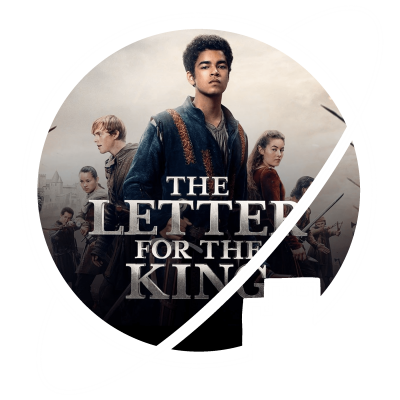

Are you wondering whether you should try this series? Please do not click the play button. You will regret it. I can be easily impressed by book-to-screen adaptations, but this version is absolute garbage. When Jop and I were watching the episodes, we used to joke that the best actor in the entire cast played Ardanwen, the horse. There suddenly is magic in my knight’s tale and Piak the charming mountain boy has been reduced to a silly brat. I did not enjoy one minute of this and I am very sad that Tonke Dragt is still alive to see this adaptation. Just read the book. Please, just read the book.

(This review relates only to the first (and hopefully last) season of this show)
Netflix’s The Letter for the King is the perfect example of how to butcher a carefully crafted story through tragically misunderstanding what a fantasy story should entail. And I hate it.
Some of my bitterness with this adaption might be attributed to my childhood passion for the source material (the book written by Tonke Dragt), but the unfortunate truth is that I started watching this series with very few expectations. In fact, I was curious to see how Netflix would improve on some of the areas the original story lacked, such as the inclusion of POC’s and female characters. Truth be told, Netflix’s version delivered in that regard, but failed miserably on everything else.
One of The Letter for the King‘s major problems is the fact that the creators tried to unite elements of The Lord of the Rings and A Game of Thrones within a children’s story that absolutely did not need such grandscale embellishments, because it thrived on subtle heroics. The inclusion of magic does not necessarily make for a better story. Similary, the inclusion of grim moralities does not necessarily make for a better story. If you still choose to include such things, you should do this with care, not simply because you aim to tick some boxes from the ‘fantasy check list’.
Which brings me to one of the other main issues; the writing for this series is just not good. Jasmijn and I used to joke Ardanwen the horse was the best actor in this series, but that’s only because that horse didn’t have to deal with a weak script. The child actors (Amir Wilson, Thaddea Graham and Ruby Ashbourne Serkis, specifically) actually showed much of promise. Similary, there were a few great/proven names (such as David Wenham, Andy Serkis, and Kim Bodnia) that I know to be good actors, but who could just not sell whatever the writers wanted to convey. That’s just a shame.
I wish I could leave you with some positive remark, but nope. This series was just not for me.
See also:
Tagged:

- Collected on:
- Books written by J. K. Rowling
- Published in 1997
- It's the entire 7 part Harry Potter series!
Do these books even need an introduction? They are the famous story of an eleven-year-old orphan who finds out he is a wizard and becomes a student at Hogwarts School of Witchcraft and Wizardry. Seven books filled with exciting adventures await…
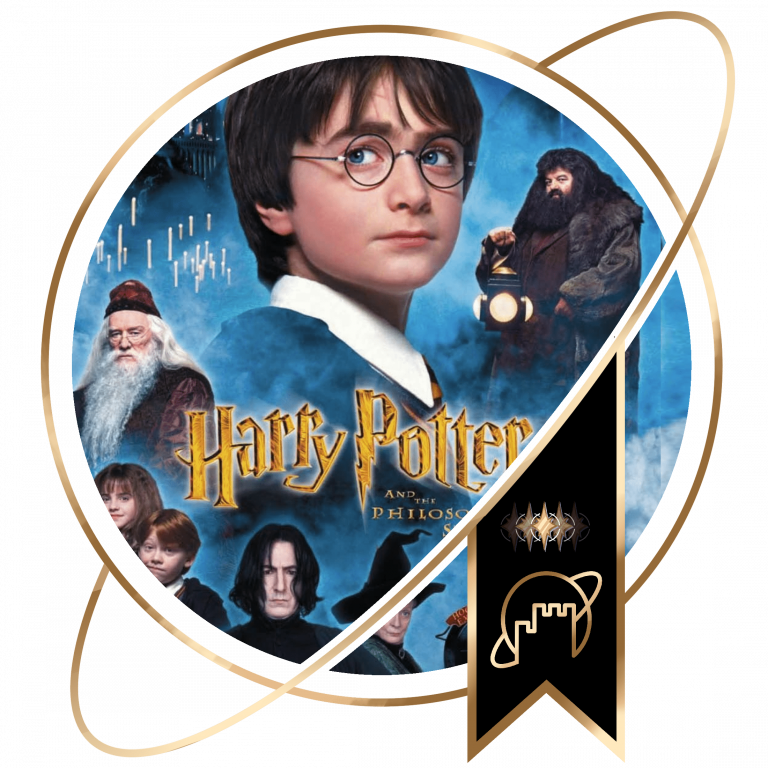
Peter: Welcome to this spoiler-free discussion J.K. Rowling’s Harry Potter series, which we’ve decided to add to the Escape Velocity Collection, a series of items that we believe represent the absolute peak of what the speculative genre has to offer.
There are some pieces of media which everyone knows, and which have been so influential that the Collection just isn’t complete without them. The Harry Potter series is one of them. Below, our curators discuss what Harry Potter has meant to them.

Robin

Key

Jasmijn

Peter

Lotte

Jop
My dad read all Harry Potter books to my sister and me (even though by the latest installments we really were a bit too old for that), and it is through the lens of that experience – of my father reading the books to us – that I still view the books. It’s also why I enjoyed the first four so much more than the three that followed – the books got longer as the series progressed, and less suited for the pace of a dad reading twenty minutes every night. It might also be that the books got darker and Harry got moodier towards the end, and I felt like that kind of heavy subject matter suited Rowlings’ style a little less.
Having said that, as nonsensical as the worldbuilding sometimes was, Rowlings’ whimsical creations did really spark my imagination. The Wizarding World is full of fun scenes, brilliant ideas, interesting characters, and believable emotional drama.
In conclusion, I like Harry Potter, and if you haven’t read the series yet – all I can say is, you’re missing out on a phenomenon. On the scale of Potter fans, however, I’m really nowhere near the top.


Harry Potter was a huge part of my childhood, and together with the Lord of the Rings it’s what got me into fantasy in the first place. Just like Peter, my father read the first book to me and my sister, but after that I read the second, third and fourth books on my own. And then the waiting started for the release of (the Dutch translation of) the fifth book. It was such a hype back then, I remember reading newspaper articles in the weeks leading up to the release speculating what would happen in the final books. It’s hard to imagine such collective excitement about a single piece of media these days, and I really miss it. Sometimes I wish I could be that little girl again for just a moment, full of excitement while standing in line before a bookshop in the middle of the night for the release of the next of her favourite books.
Of course, these days my feelings about Harry Potter are a lot more conflicted than they were back then, mostly for the reasons that we will get into below. But however I now feel about its author, it is impossible to deny the impact that Harry Potter has had on me. Even all these years later, it is still an incredible story with characters whom I consider to be beloved old friends.
I was a bit late to the Harry Potter party. Others grew up with the books, I had heard about the franchise, but my parents steered me away from any media containing magic when I was young. However, I was very interested in the books, and when I discovered them in our High School library I smuggled them home one by one to be read under the covers until dawn. I finished the entire series within a month. Pros: I was completely submerged in this fantasy world. Cons: I still couldn’t tell you the timeline of events. All the stories are one big blob in my brain. But it’s a blob of stories I treasure. With my little twelve-year-old act of rebellion I got to experience all the adventures of these well known characters. And I felt a lot more mature after that. I never quite felt connected to the books in the same way some other curators do, simply because my experience lasted a month, instead of years. However, seeing Harry, Ron and Hermione grow up together gave me some comfort and courage in a time when growing up felt scary and strange.


Like many others, I devoured the Harry Potter books when I was younger. I’ve even reread them multiple times. A magic school, high school drama and (murder) mysteries; it was an excellent recipe for an intriguing read.
Nowadays, however, I’ve come to learn there are many other books out there that are much better suited to my tastes. Though I agree that the Harry Potter books have justly made a huge impact on the fantasy genre and therefore deserve a place in the Collection, they are not among the best written books I’ve read.
How to sum up a childhood in two words: Harry Potter. No further comment.
Never mind, I can’t help myself. I think Harry Potter is at the core of my family relationships. From the second book onwards, my mother read the amazing Dutch translation to my sister, my father and me after dinner. At the middle of the table was a ‘druipkaars’ and if my sister and I didn’t go too far, we could play with the wax and the flame. Every free evening was spent reading The Book. When a new book came out, we went to the night-time release at our local bookstore, dressed as wizards and witches (both my sister and I have appeared with our outfit in the local newspaper). When a movie came out, we went together. When we went on holiday, we listened to the audiobooks read by the wonderful Jan Meng. We developed a shared language of inside jokes and quotes of the movies. The Prisoner of Azkaban may be the best, but all parts have left their mark on me.
Except for all the milking of the popularity afterwards. Of course I have made an account on Pottermore, seen the Fantastic Beasts, been to the Harry Potter Expo, but I am afraid those came too late for me. The original magic is… poof!


When I was in elementary school, loving Harry Potter was basically my personality. I was obsessed. I would go to the midnight book releases, dressed up as a witch. I made my own wands and me and my friends pretended to be the kids from the series during school breaks. I was always Hermione, and I was definitely the most committed. I even used to write essays on magic creatures (this proved to be really useful for my time at university, because at that point I’d become very skilled at copying a text in such a way that I was saying the exact same thing, using completely different sentences – thanks J.K.).
Unfortunately, like Key, my love for the series started to fade at a certain point.
Rowling Trans Rights Controversy

It’s a sad fact, but nowadays, no discussion of Harry Potter is complete without a conversation on Rowling’s transphobic shenanigans on twitter. Lotte, this one seems right up your (Diagon)alley. Can you still read Harry Potter in peace?
To be honest, I started getting a little tired of the series before Rowling began spouting transphobic nonsense. Yes, I grew up with the series, but when we were at university, it was (and still is) everywhere. I hate to be the kind of person who dislikes something because it is popular, but I suppose I was just all out of love to give at a certain point. I did still have fond memories of the series, but just got a little tired of seeing merch for it all over the place (where was that merch when I needed it???). And then… well.
I wouldn’t recommend the series at this point, but mostly for the following reason: if you haven’t read Harry Potter yet, you are basically a unicorn. Bask in how special you are, you deserve it. Now take a moment to decide if you want to read the books. Why haven’t you read them yet? Have you seen the movies? Are there other books on your to-read list? Is the series readily available to you or would you need to buy them or borrow them? I know Rowling is rich as hell already and telling someone not to buy her books won’t make her any less so. However, She has power because she has cultural significance. People care about her because her books are this Big Thing. As long as people love Harry Potter, Rowling will continue to hold that power. So, I’d say there’s plenty of other good books that you can read instead.
If you want to dive more into exactly what Rowling has done that is so upsetting to many people, there’s a bunch of good video essays out there. Here’s one by Contrapoints’s Natalie Wynn to get you started:


This whole issue just makes me feel very sad. J. K. Rowling has such a large audience at her disposal, and the fact that she has decided to use the power that this gives her to spread hate instead of trying to make the world a better place is just incredibly disappointing. Ironically, it also feels so contrary to the message of the Harry Potter books, which are about love and acceptance (although they could be much improved on the diversity front). Over the years the Harry Potter fandom has been a place where so many people have been able to find a community of accepting and like-minded people, and all J. K. Rowling needed to do not to ruin this was to shut up. Sadly she didn’t.
Conclusion
In conclusion, liking Harry Potter might be a mixed bag these days, but I think we can all agree that reading the books is a collective experience that helped shape our generation’s views of fantasy. If you somehow managed to not read these books, you’re missing out – so go find a way to obtain them that doesn’t give J.K. any more money than she already has (borrowing them shouldn’t be hard, basically everyone owns them).


Or, like I suggested earlier: bask in the glory of being able to tell people you’ve never read the series. When they tell you you should, tell them you don’t think so. You can really have fun with this, especially if you refuse to explain why. Just… nah. Don’t think I will. Try it!
That’s us signing off for now – we’ll see you again in the future for more additions to the collection!
Reviewed by:
- TV-show created by Dan Fogelman for ABC
- Starring Joshua Sasse Timothy Omundson Vinnie Jones Mallory Jansen Karen David Luke Youngblood
- First Aired on January 4th, 2015
- 2 seasons
In this musical comedy, Galavant is a dashing knight who has retired from adventuring after his one true love, who has been kidnapped by the evil king Richard, decides she’d actually prefer being queen over going back to her former lover. The story follows Galavant, his squire, and the princess Isabella, whose family has also been captured by the king. On the way, the trio encounters twists and turns – of the musical variety.

(This review relates to both seasons)
If there is one show that is TRAGICALLY underrated, it has to be Galavant. This show is SO GOOD you guys. I love musicals. Like, I super love musicals. The music in this show is written by Alan Menken. Astute observers will probably know the name, as he is the writer of some of the most popular Disney movie musicals of all time. Because of this, musically, the show is perfect. It has recurring motifs and a consistently of quality that is just chef’s kiss.
It actually reminds me a bit of Disney’s Enchanted, you know, the one where a fairy tale princess ends up in New York and sings with rats and pigeons? Galavant has a similar style of humour.
While this show is primarily a comedy, the characters actually have a remarkable amount of depth. The plot is based on common fantasy tropes that get twisted at any point, basically. No really, there are a lot of plot twists in this show that I absolutely did not see coming, and they’re all incredibly funny and don’t actually make the show confusing at all.
I would recommend Galavant to anyone who enjoys Monty Python, the Music of Alan Menken, and fantasy that is a bit more on the quirky side. It’s also not unlike Terry Pratchett’s books in humour, so if that’s your jam (haha, get it?), you should definitely check this out. I actually spent way too long writing this review because I got stuck watching songs from this show on Youtube. Oops.

(This review relates to both seasons)
This hilarious parody on fairy tales and knightly stereotypes is a hidden gem. The main selling point for me was most definitely the fact that it is a musical, with music composed by Alan Menken, in a way only Alan Menken can. The songs are still blasting through our living room every now and then. It is an easy series to binge, with a simple plot that has a few twists, mostly due to the flaws of our likeable main characters. There is a lot of humour in every episode, but there is still room for some character growth and story arcs.
With only two seasons, why not give it a go? Warning: the songs will get stuck in your head.

(This review relates to both seasons)
I was sceptical. Most musicals are too melodramatic for me. Most short comedies too – how can I describe that – too much, too American. But this… This was extraordinary fun!
The best thing about this show is how not-serious it takes itself. It knows exactly what it is and uses that to poke fun at itself and the genres of fantasy, musical and comedy. And from that point, it finds a surprisingly good story to tell, with character growth and plot twists.
But of course the highpoint of the show are the songs. With 18 episodes of around 20 minutes it has an astonishing 118 minutes soundtrack, meaning that for less than every 8 minutes of screentime there is a minute of song. And they are all so good!
You have to be open to musicals and a bit of absurdity, but if you are only a little bit, give Galavant a try!
Tagged:
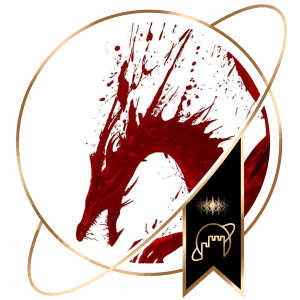
Collected: Dragon Age: Origins by Bioware
COLLECTION: Forced by circumstances to leave your old life behind, you join the ranks of the Grey Wardens, an ancient order sworn to protect the world against the murderous Darkspawn.

Science Fiction & Fantasy New year’s Resolutions
Need help setting New Year’s Resolutions? We have some ideas for you!
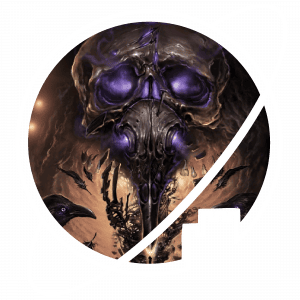
Review: Strangeland – Wormwood Studios
In this point-and-click video game, you’ll find yourself trapped in a madness-inducing cycle of death, desperation and poor jokes, chasing a golden-haired woman through a creepy world of croaking ravens and hollow laughter.
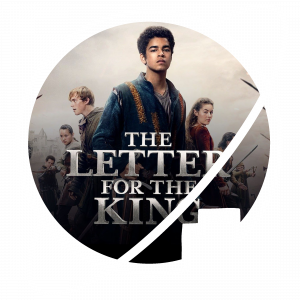
Review: The Letter for the King – Netflix
Young squire Tiuri has difficulties living up to his father’s name when it comes to the virtues required for knighthood. One night, his greatest challenge yet presents itself with a call for aid that sends him on a dangerous mission to deliver a secret letter to the king of a neighboring country. Why are people hunting this letter? And what is the significance of Tiuri’s own ancestry?
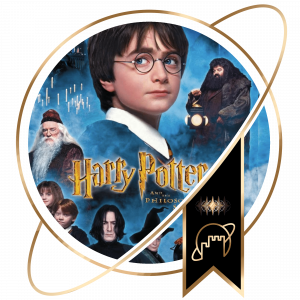
Collected: Harry Potter by J. K. Rowling
COLLECTION: Do these books even need an introduction? They are the famous story of an eleven-year-old orphan who finds out he is a wizard and becomes a student at Hogwarts School of Witchcraft and Wizardry. Seven books filled with exciting adventures await…
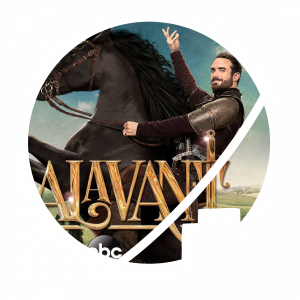
Review: Galavant – ABC
Review: Galavant is a musical comedy about a handsome yet washed up knight, who sets out on an epic adventure to win back his kidnapped lover.






